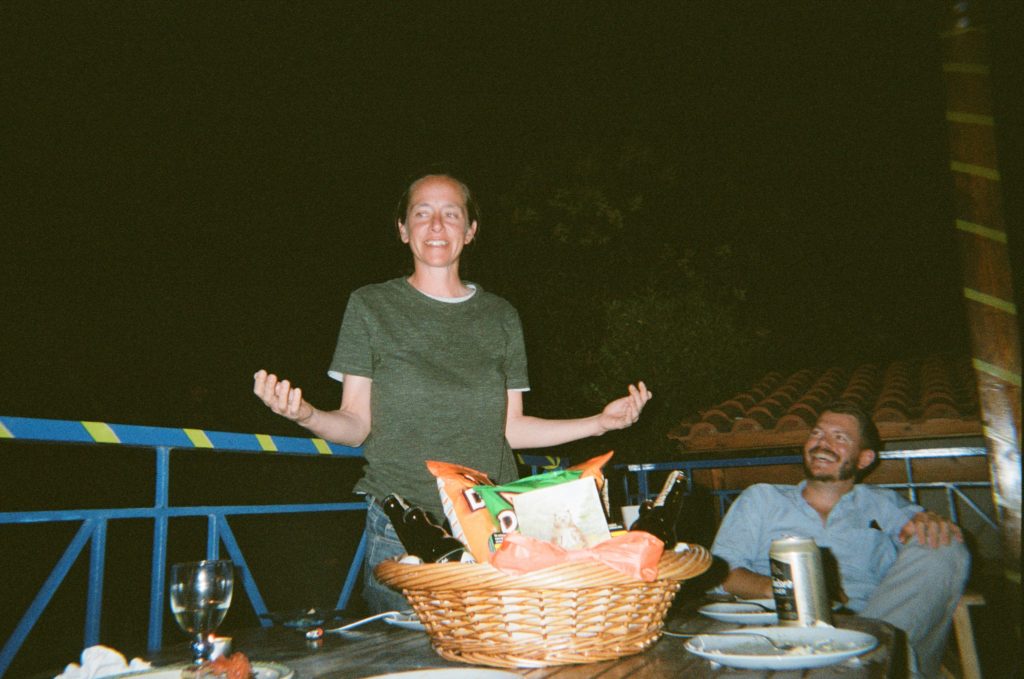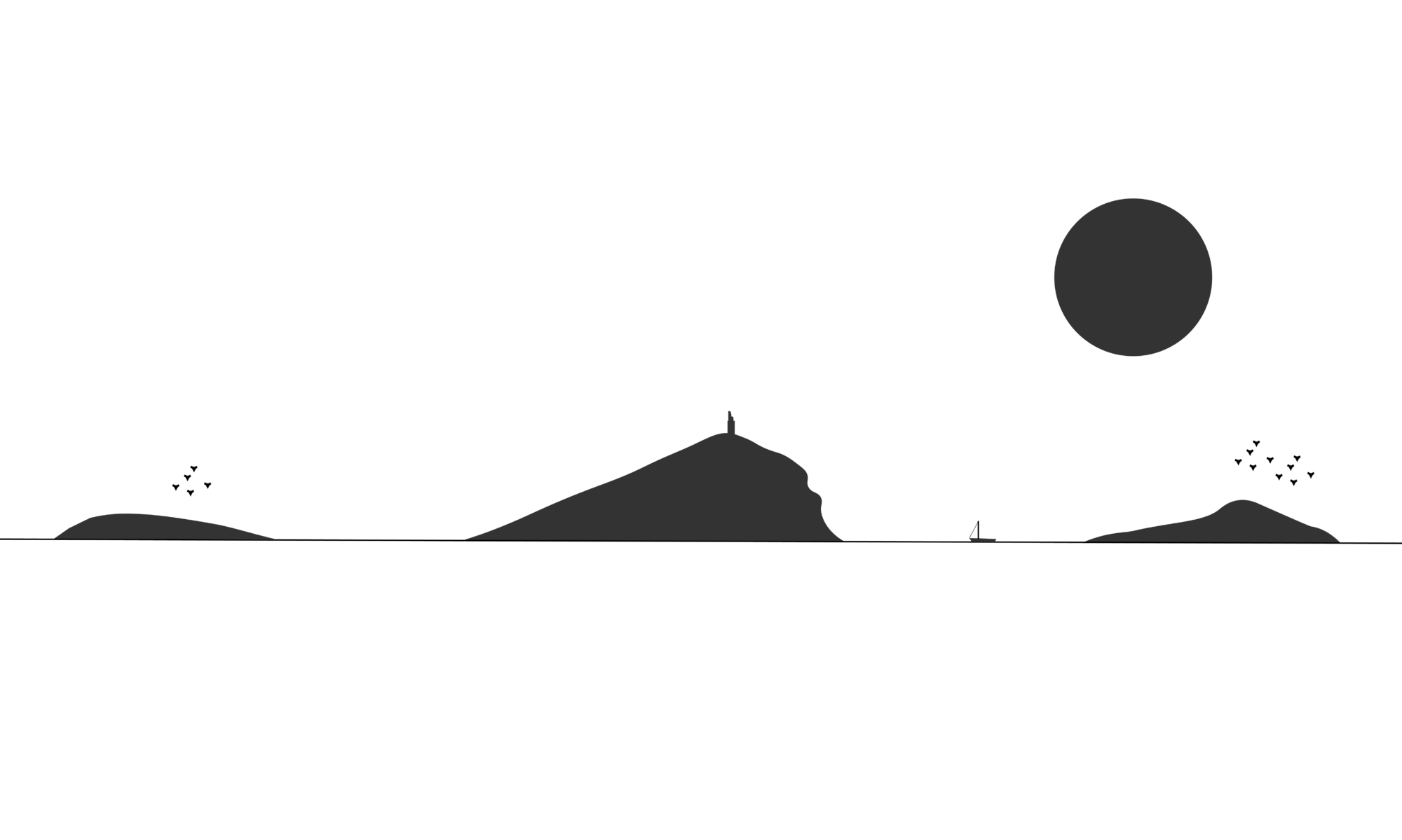After a relatively lengthy hiatus for summer vacation, the BEARS blog is making a late-August return to life with the 8th in our series of team member interviews. This time we are featuring a subject well-known to faithful blog readers, Irum Chorghay, who already provided a series of captivating posts documenting life on the BEARS project in 2019. I have been happy to be pals with Irum since fall of 2017 when she was a student in my introductory Greek and Greek history classes, and have worked with her in many contexts since, including several other courses at U of T, a Jackman Humanities Institute summer research program, and a co-authored research article that she worked with fellow BEARSer Jenny MacPherson and myself to publish in the January 2020 issue of the American Journal of Archaeology. It has been a real privilege to get to know Irum over the last several years, and we had a great conversation about all things Classics and BEARS related, which I am sure you will enjoy reading! Be sure to check back soon for an update on our tiniest of 2020 study seasons, and more riveting interviews, in the coming weeks.
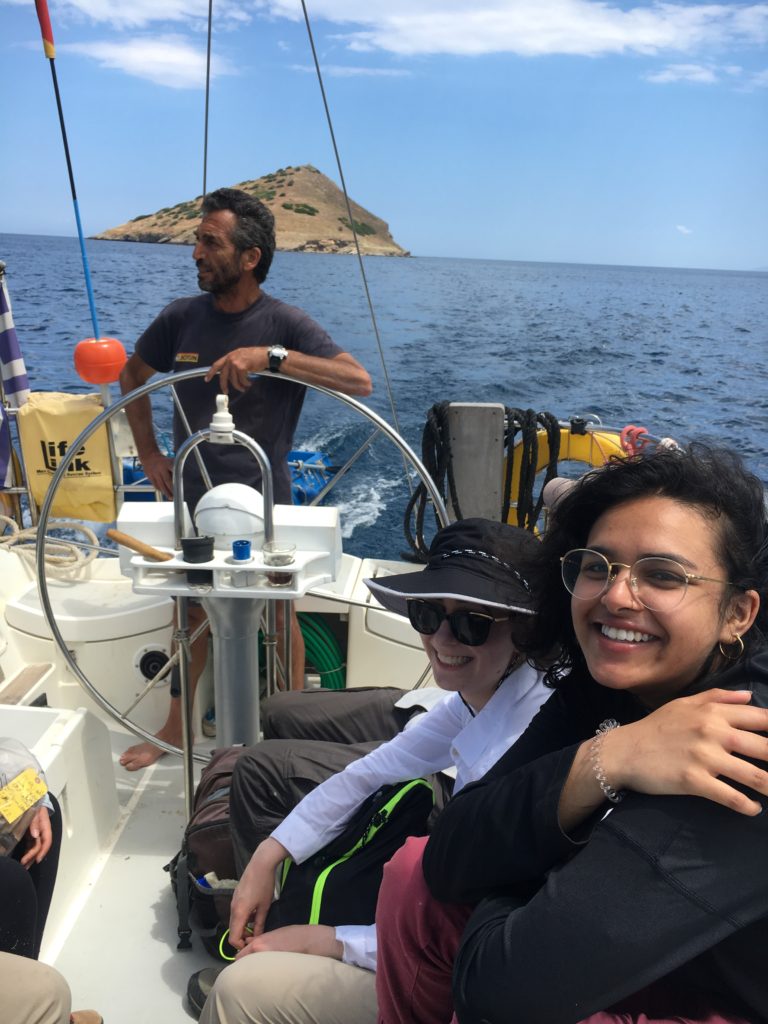
SCM: As you told me the other day via email, you are just finishing your degree at the U of Toronto this summer and taking some summer classes to wrap that up: how has it been taking classes this summer and what does it feel like to be entering a new phase of life after graduation?
IC: Classes this summer have been going really well! Right now I’m taking a course on the politics of girlhood. I’ve never really looked at children from an academic perspective so it’s really fascinating material, as well as really relevant to modern circumstances, such as the adultification of black girls…it’s very interesting to think about girlhood. Girls are so powerful! I think I might want to keep up with what is happening in girl studies going forward.
This is obviously quite different from what I’ve been studying in the Classics department, where the connection to modern times is not so straightforward. I guess it’s a nice way to end my degree because it brings things back to reality in a way. Otherwise, I’m not sure how I’m feeling about finishing my undergrad! I am definitely not processing a lot emotionally right now, it’s been a “go go go” kind of situation. I think maybe 4-5 years from now I’ll start unpacking everything that happened this summer, so then I’ll really know.
But I’m honestly excited. I’ve been in school for so long, it’s going to be nice to not do that for a while and see where it takes me. Also, kind of scary! But I think I’m ready for a new challenge.
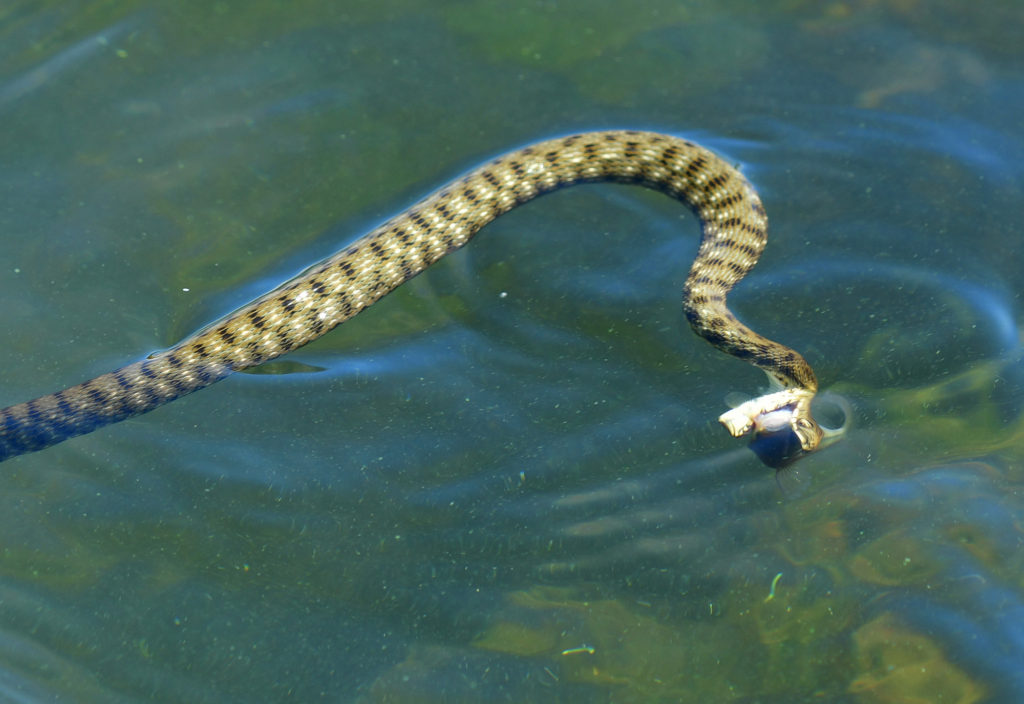
SCM: Awesome! You’ll be great, no matter what, I am sure. Let’s cast an eye backwards, then, on your glorious career at the university of Toronto. You did an incredible amount of excellent work at the U of Toronto – a double major in Classics and Philosophy, is that right?
IC: Well, in my last year I realized that I had accidentally pretty much finished the Classical Civ major, so I ended up doing that alongside the Classics (Greek and Latin) major. I feel like my entire undergrad was very much me denying that I was trying to be a Classics major, because I just kept doing Classics courses, but then being a Math major, and then a Philosophy major – literally it was only at the very last minute in my fourth year that I actually clicked enroll. Now I am a double major: Classical Civilizations and Classics.
SCM: Ah ha, I see! A reluctant Classicist, but you couldn’t escape it as hard as you tried, like falling into a swamp. Despite this circumspect attitude, I recall that you were very active within the Classics department since I met you: you were the president of CLASSU, even. How was your experience with the people and the environment in the department, even as you tried to keep the major at arms-length?
IC: I think a big part of why I ended up in Classics even without actively pursuing was because of the professors I had, the friends I made, and generally the people I met. At the end of the day, I knew I wanted a degree, but it didn’t really matter to me what it was in. I wanted to follow where I felt I was growing a lot and having a good time in a lot of ways. And I felt like Classics really did become that for me. It wasn’t really until second year that I started getting involved in CLASSU events, then in third year I became really involved on CLASSU. That’s when I started making many of my friends and feeling like I was really a part of this community – Classics really brought me that. My peers will always bring up Professor Wohl in particular, how she remembers you, your name. I can’t imagine many other professors, particularly in first year, really doing that. And at a huge campus like UofT, it is really remarkable to have a professor remember, and I really respect that. More generally, CLASSU was a genuinely safe space for me to explore who I am in ways that unfortunately other places on campus don’t really encourage, so for me that was really an important part of my experience here!
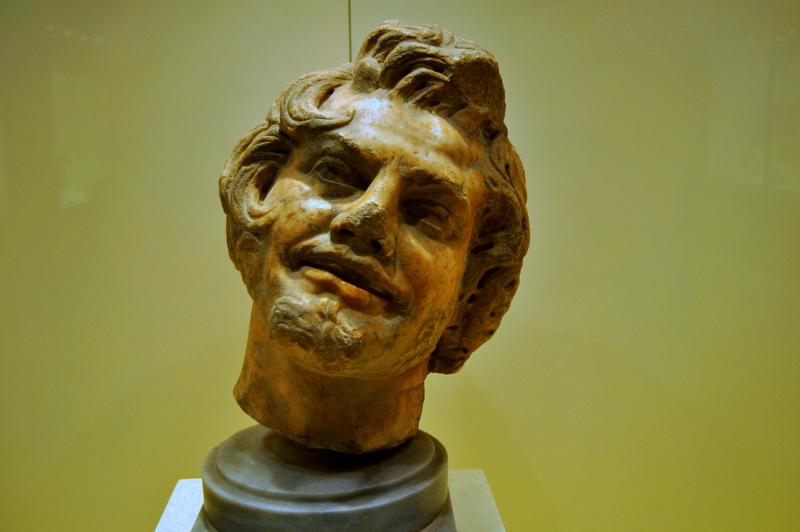
SCM: That’s really cool to hear, actually, from a faculty point of view. I guess my impression is that this kind of thing happens a lot in Classics departments, maybe because they are small departments, so you tend to have a community of people that are really excited about the material but also it’s not some major of hundreds, so you see the same faces in a lot of classes. And the same situation with the professors – our classes are pretty small and we tend to build actual relationships with the students, which makes it easier to see students as individuals, you know, with a name and everything. I sort of ended up as a Classics major for similar reasons – I felt totally alienated as a first-year student but then some Classics professor actually remembered who I was and seemed to think I was smart. That was totally crazy and exciting to me at the time!
I suppose it’s also encouraging to hear that Classics, even though it does not necessarily have a universal reputation as the most open or welcoming discipline I guess, can provide this kind of safe and fun environment when you’ve got the right people around.
IC: Yeah, I am sure that other people have had different experiences! I’m sure not everyone has had the same positive experience in the department…but for me the timing was good. I think in the last few years CLASSU has been really consciously trying to be open and welcoming to all kinds of people, and that has been working.
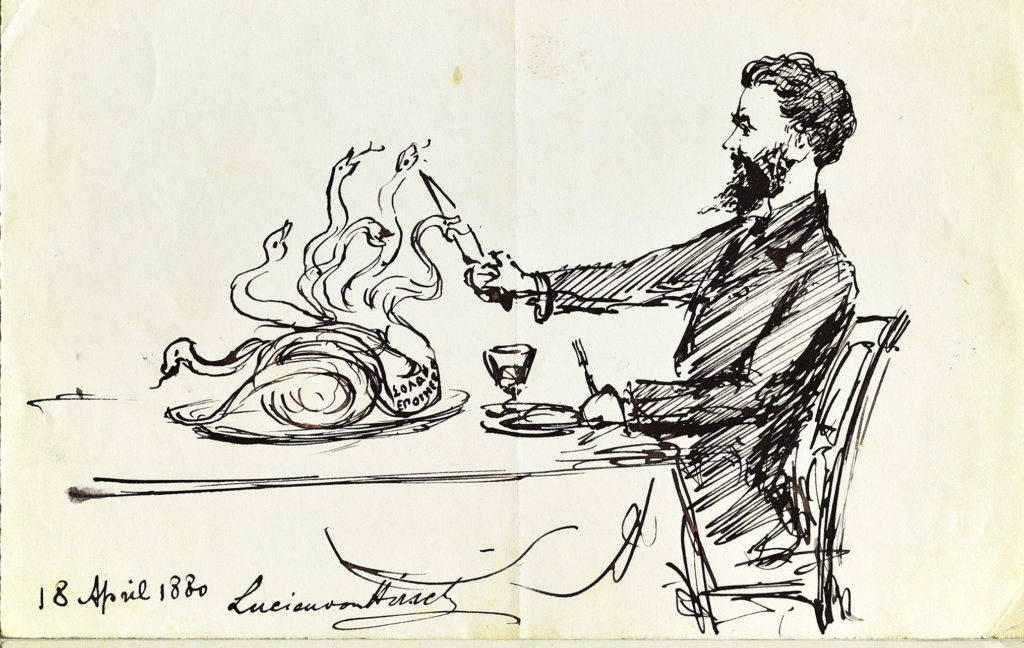
SCM: That is super cool, and a major credit to you and the organization. I think CLASSU is an amazing asset to the department, and we’re all really thankful for your amazing work! What about the discipline or the work itself? Is there anything particular about the material that kept you coming back again and again despite your attempts to gravitate elsewhere?
IC: One of the first things that really drew me in was Catullus. I am a poet and I love poetry. With Catullus in particular…I guess you just end up seeing him a lot. He’s such a funny guy, and he’s got such range, too. One minute he’s cursing his friends out, the next I’m crying over his brother’s funeral. But to take up some of his crudest stuff in a university classroom was just so exciting and bizarre to me.
Sappho is, of course, another one of my favorites. I read Anne Carson’s essay on Eros the Bittersweet and that just tugged at my heartstrings (I am a really sentimental person). I guess it would be fair to say that the poetry is what really drew me in. Then my indecision is what helped me stay, because I got to do philosophy and literary analysis but also history and archaeology. Yeah, I basically can’t make up my mind, and Classics gave me a chance to do a lot of things. I think that’s why a lot of people end up doing Classics.
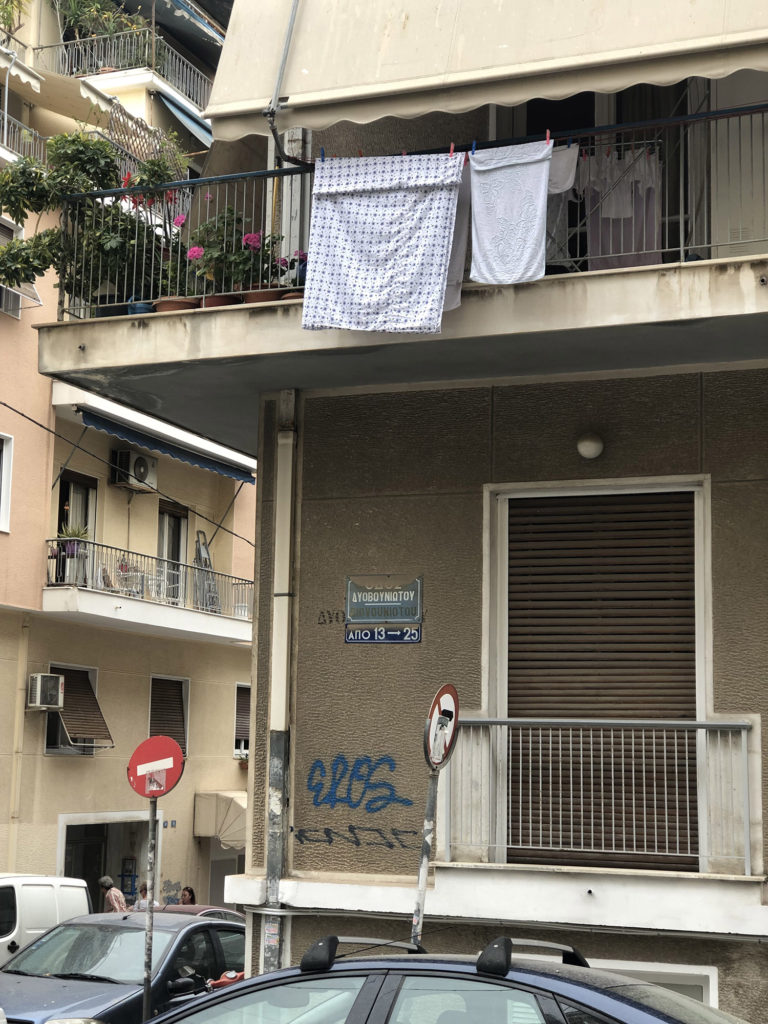
SCM: Yeah! That’s the whole model of liberal art’s education, right? You learn how to flex a lot of different muscles in your brain instead of just focusing on one thing, and Classics gives you a good opportunity to do that: lots of different work but within a single theme. It’s good that students still value that kind of education! Do you have a favorite text or object from the ancient world that you return to again and again? Or that always makes you very excited no matter how many times you encounter it?
IC: Ugh, hard question! I don’t know if this is exactly the ‘best’ thing, but I will always remember reading Seneca in Sex and Gender with Chiara Graf (A U of T grad student). That was a really good class – we incorporated critical theory in class, which was the first time I had done that. We looked at a passage about a character called Hostius Quadra. The whole text was super strange and very orgiastic and just generally fascinating. It felt quite random, being that it was in a scientific text, and that really stuck with me. It really showed me the range of Classics. I guess we always have this perception of fancy Englishmen wandering through fields and being all classy in Classics, and this is the exact opposite! This is what they are hiding! This is what they don’t want you to see! It felt very much like the underbelly of Classics, which was cool to see.
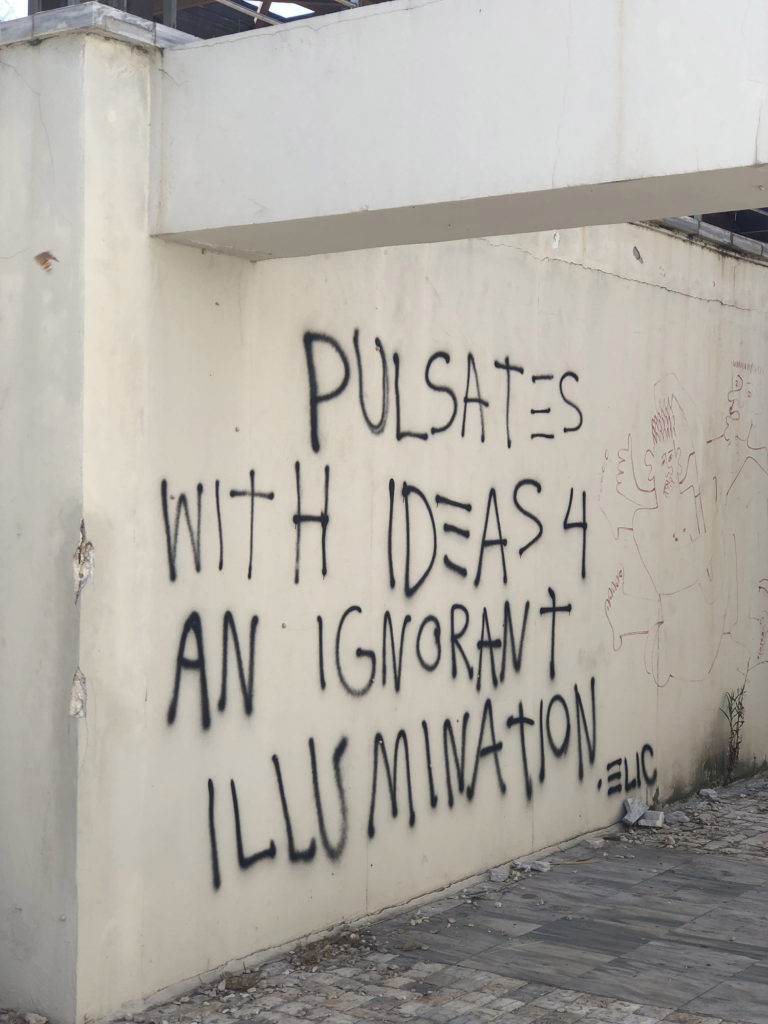
SCM: Right! That’s why you have to read the actual primary sources – the stuff you find out about in the textbooks or see in more general introductions is usually the fancy Englishman foppery – so you have to get in there and find the underbelly yourself! The stuff that doesn’t fit the model is usually the most interesting. Returning to the future, how do you think what you learned and encountered in university is going to contribute to your experience or growth in life? Are there particular skills or perspectives that you think will stick with you as you go forward to function in the world at large?
IC: I’ve been thinking about this a lot lately. I think one of the biggest things is that when you study a society from afar, you train yourself to be as objective (okay, with an asterisk) as possible, but you also learn all of these skills to try to remember our place in relation to what we’re studying, so that you remain aware of your own biases even as you try to come up with an objective analysis. That’s been a big focus in these last four years. I think that is really relevant in our day to day lives, because it’s so easy to take everything around us for granted. When we step back and look at ourselves as an object of study, then we can really become active contributors and better citizens of the world. That is probably the biggest skill that I think I’ll take away from my education – being super critical of myself and my role in society.
I also think the multidisciplinary nature of Classics is really pragmatically useful – being able to read, write, and think critically is huge. Also just being interesting? People want to work with interesting people…and thanks to Classics I know tons of random facts that I can tell people, should they wish to hear them.
SCM: Wise words! I think society would be much better off if more people were good at critically evaluating their own role in sophisticated ways. Now, to your last point – let’s say we’re at a cocktail party and I want to know an interesting fact: what’s your go to!?
IC: ……….Oh boy….I guess I set myself up for that one! I shouldn’t have said that!
SCM: You totally did! I’m putting you on the spot!
IC: I don’t know why, but when anyone says “interesting fact” for Classics the first thing that comes into my head is pederasty, and I always want to steer away from that….
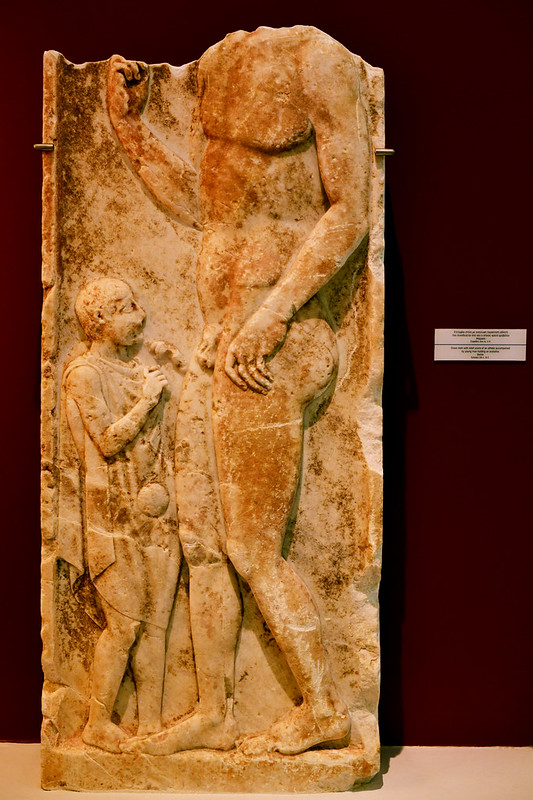
SCM: Yeah, I gave a guest lecture in a fashion history class at Ryerson University – the teacher asked me to come and give a lecture about why the Greeks were naked all the time – and I was explaining all of these complicated theories that scholars have put forward about athletic nudity, and one student raised her hand and asked “Isn’t it just because they liked staring at naked little boys because they had sex with them a lot?” And I said that was a very logical conclusion to draw! Anyway there were tons of questions. These kids could not get enough of dissecting the naked Greek dude imagery complex. So, I think this is definitely something that, if you bring it up at a cocktail party, people will want to talk about!
IC: I also really like the idea of the Herms, which we talked about in your Greek History class.
SCM: Also something that most people don’t necessarily think about when they imagine Classical Athens!
IC: And another thing that makes you question why people love Classics so much…
SCM: Depends on your perspective! The weird stuff is kind of the best part, to me – I think people come and start in Classics because of some fusty idea about the Parthenon or whatever, but the more you get into it, the more you realize there are all kinds of wacky and bizarre things going on that are really fascinating.
Another thing that you can bring up at cocktail parties is the fact that you’ve traveled to Greece and done archaeological fieldwork. Last summer you were in Greece working with BEARS, and I know you did some traveling around before the project, too. How was your experience of Greece and how did that fit into your career otherwise? Were there any favorite memories or sites that particularly stand out?
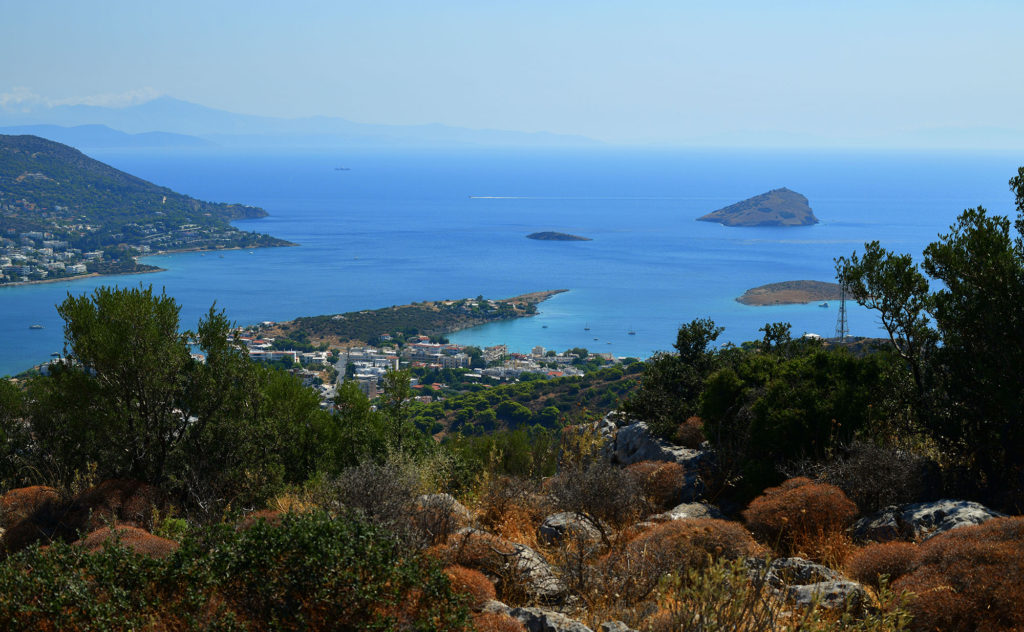
IC: Going to Greece was definitely the highlight of my Classics experience! I think it’s kind of wild how you can study a place for years and then it’s so different when you are actually there and you’re seeing where things happened, and you understand why, say, this war happened this way, because the geography kind of determines that. It was a very rewarding experience.
Okay, I don’t love change, so I tend to dislike travel. I get so overwhelmed and really nervous, so this was very much me going out of my comfort zone – all of last summer was out of my comfort zone for me. But because of this same reason, it was an incredibly rewarding experience as well. I definitely felt a shift in me when I came back. I also didn’t really love the outdoors so it was incredible that I was able to do all that fieldwork. But now I’ve grown quite fond of spending time outside; I don’t fear creepy insects and stuff anymore. Once you’ve seen so many spiders that big, everything else is a joke! I’m so glad I went, and really grateful that I had the opportunity.
We did travel around before the project. It was so wonderful. I am wary of romanticizing Greece too much but I will say that one of my favorite things was the graffiti in Athens, which is really, really good. Definitely still think about it now.
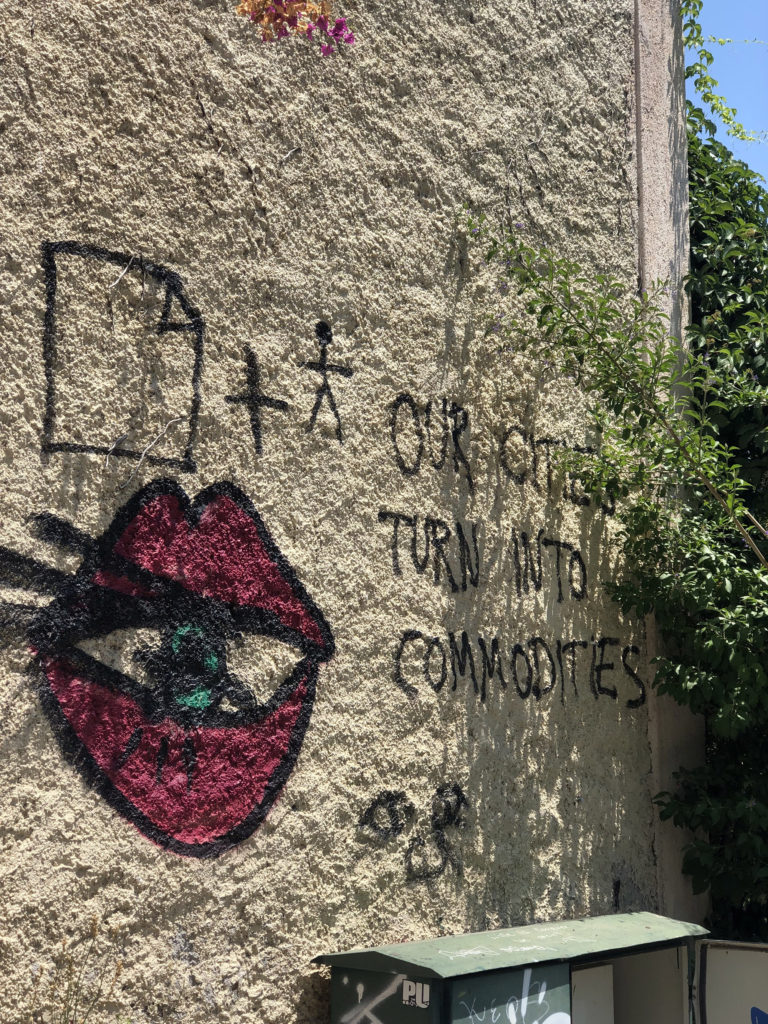
SCM: Oh boy, I totally didn’t realize how much you were uncomfortable with travel and being outdoors when I asked you to come and work on the project!! I shouldn’t have tortured you and subjected you to all that!
IC: No, no it was really great! It made me stronger.
SCM: Okay, okay. I’ll try not to feel guilty about being so oblivious to your discomfort. That’s an awesome point about the graffiti…it is really good! Students never mention this…you obviously have a keen eye. I was just wandering around Athens in July and it was totally empty and like a giant open-air graffiti museum. You would have loved it.
So, working on the BEARS project was probably very different probably than taking a course on say, Ancient Greek history or literature. You already wrote about your experiences of fieldwork very eloquently already on the blog, but I wanted to see if you had any other more informal thoughts about being out on the project and the whole situation? Any favorite or least favorite parts?
IC: Doing work with your hands is so underrated…that was really satisfying, to actually be productive with your body instead of your brain, which is not what happens in a classroom. It was also so cool to touch things that have been made by humans and sitting in the ground since forever. There is something very spiritual about that, it feels like you are connecting with something from very far away, which I thought was inspiring. I also thought obsidian was the coolest thing I’ve ever seen or dealt with. It’s also a great word for poetry, and now I feel like I have more authority to use it, so thank you! I guess the negatives would be maybe that you get hot and hungry and sweaty, but you don’t even remember that once the day is done because you are just excited about what you found. There are very few cons. I just felt so lucky to be able to do the work.
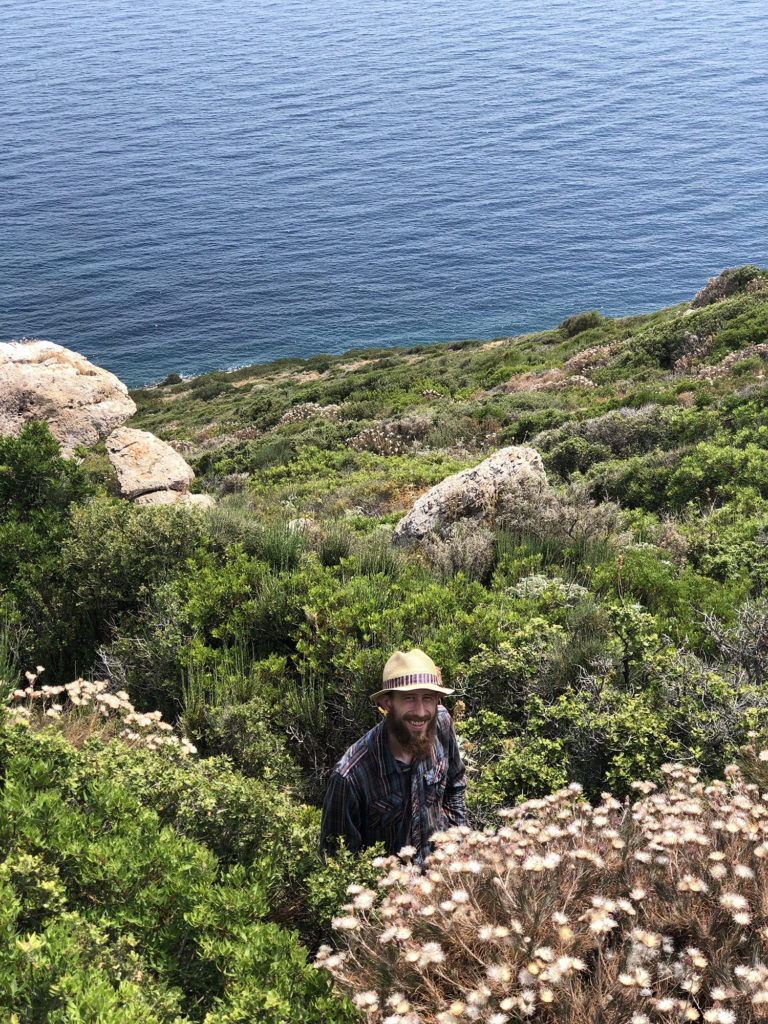
SCM: Yeah, that’s true, it’s a special experience! I’m glad you enjoyed it.
IC: We had a great team, too, and everyone took care of each other, so we didn’t really have any problems. I also think we were very well looked after by our director.
SCM: My main goal was for everyone to have a good time and not get hurt, so I’m happy to hear that was mostly the case. I also agree that obsidian is amazing! I find it to be inexplicably seductive! It is clear that we are on the same page.
IC: Wait, there are people who don’t care about obsidian? What’s the con?
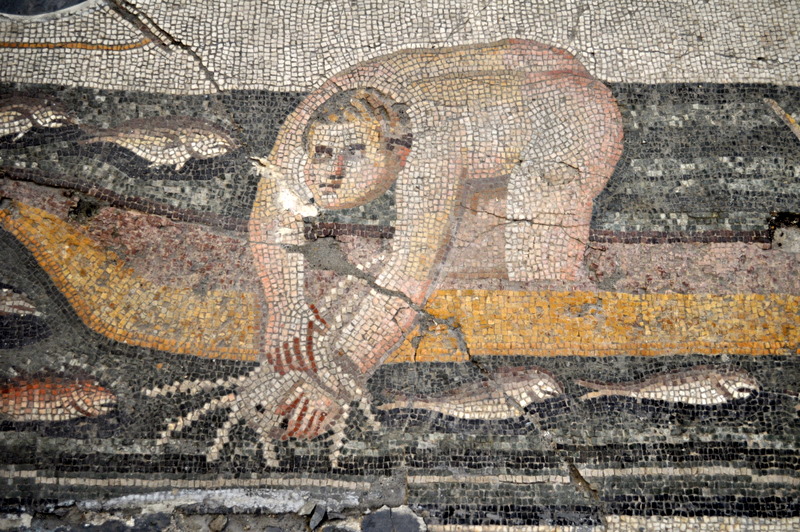
SCM: Good question! I guess everyone’s got their own thing. I mean, it’s so shiny! I would like to sleep in a bed of obsidian, even if it would be uncomfortable, just so I could be around it all the time. How about collective life on the project? Any memories or impressions about living with the crew in Porto Rafti?
IC: I was nervous coming into it, because meeting people makes me anxious, but honestly it was so much fun and I had such a good time. I really miss the people this summer. I guess because you are spending so much time together and living together it can go either way. But I think it’s never in the middle – either you really love these people or you really can’t stand them, and we definitely fell on the love each other side. It was all new people, but because we were mostly from Toronto we had something in common to start from. We had a nice family vibe going. There was lots of bonding, being silly, drinking, there was a Dora the Explorer doll in the house that I really had a special connection with. It was just a really good time.
SCM: It sounds like fun was had! I wish I had lived with you guys! I was just boringly checking data and dealing with dumb management stuff the whole time…lame!
IC: My favorite part of the day was always right after we came home after work and my shoes would always be full of those little bur things and we were all emptying our shoes out on the porch and sitting, relaxing, making coffee, chatting about our day, in the beautiful yard. Those were just really nice moments, to be together and connect. And we always had things to say, since we always found exciting things.
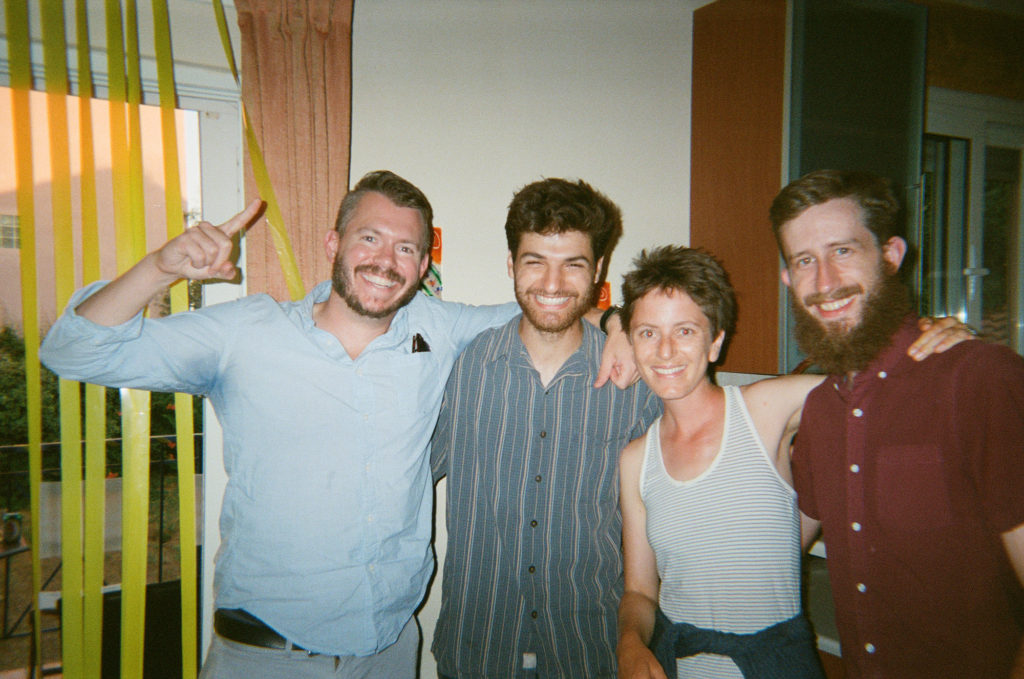
SCM: Such an idyllic scene…I love that feeling of good exhaustion after the end of a hard day of work too. Especially if you can share it with your friends. Now, obviously we’ve all had to find something else to do this summer and it’s been a bummer to miss all of those moments of human connection. What were your strategies for surviving the spring and summer of pseudo-lockdown in Toronto?
IC: Mostly I just tried not to think about it. Is that too depressing? It honestly feels like such a blur. I did summer school both semesters, so I did another course early in the summer a cinema course, so I watched a lot of movies. That’s basically all I did, watch a lot of tv and movies, read stuff, cry. And try to accept my new phase of life in very strange circumstances. I guess for me things really got turned on their head. I was going to move out of my apartment building in April, go to Greece, be away from home and explore things and have a spiritual awakening or whatever I expected to get out of it, and then come home and spend time with my parents and then move out. So the way that I had allotted my emotional capacities completely turned around. That was a challenge; it was pretty upsetting, but in the end, I guess it’s all fine!
SCM: I can’t imagine going through this at such an important inflection point in your life. I would be a total mess. But you’ve already picked up the pieces and have a job lined up starting next week! How about further in the future? I think you have basically infinite potential, but what are your visions for, say, five years from now?
IC: I’ve been watching finance videos in preparation for the real world, so one thing is that I want to have an emergency fund – or maybe in five years even more than that! I can see myself going back to school for a Master’s degree, so by five years from now I should have done that. Otherwise, I’d like to have a job and be able to afford an apartment in downtown Toronto. I also want to finish learning how to swim, which was interrupted by the pandemic, so by five years from now I want to be able to swim.
SCM: Simple like that! I guess in times like these it is good to keep things simple…my new objective is to quit my job and find a way to live in Greece and swim in the Aegean everyday – if I succeed you can join me for a swim once you take care of that goal. Thanks for a super insightful and fun interview…for now good luck with the new job and stay in touch: at the very least I will check in with you on these goals in about five years.
